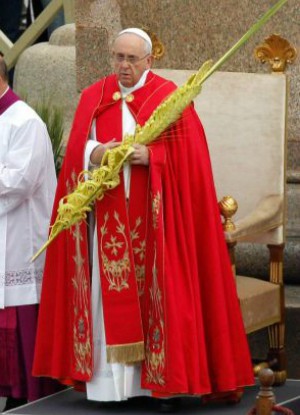Protestant
Well-Known Member
Catholic Church Promulgates Breaking the Divinely Instituted Chain of Command
“The holy Synod enjoins on all bishops, and others who sustain the office and charge of teaching, that, agreeably to the usage of the Catholic and Apostolic Church, received from the primitive times of the Christian religion, and agreeably to the consent of the holy Fathers, and to the decrees of sacred Councils, they especially instruct the faithful diligently concerning the intercession and invocation of saints….” (Council of Trent, Session 25, 2nd Decree).
“Holy Mary, mother of God, pray for us sinners now, and at the hour of death.”
It was recently brought to the public’s attention, through the case of Navy Capt. Brett Crozier, that our Armed Forces implements a chain of command which is to be taken quite seriously. To go outside this acknowledged command chain shows several negative characteristics of the perpetrator:
(1) The perp ‘knows better’ than his superiors as to the course of action to be taken in addressing concerns/requests, thereby making his judgment superior to that of his superiors.
(2) The perp has little regard or respect for the rule of military administration, including the channels through which requests/concerns must first pass.
(3) The perp is fearful the concern/request will not receive the attention necessary to achieve a satisfactory outcome, thereby casting doubt as to the effectiveness of the command chain.
(4) The perp shows lack of faith in the wisdom of his superiors who implement and administer the chain of command.
(5) The perp shows lack of faith in the ability of his superiors to execute a satisfactory outcome should he adhere to the established chain of command.
These same negative characteristics may be applied to the Catholic Church which encourages, promotes and endorses prayers to the saints – the cult of Mary being the most grievous - in direct violation of the divinely instituted chain of command. Such overt opposition and hubris must be considered anti-Christ, for it is Jesus Christ who declared to whom our prayers are to be directed.
Divine Chain of Command Clearly and Simply Stated by Jesus
(1) We are to pray to the Father:
But thou when thou shalt pray, enter into thy chamber, and having shut the door, pray to thy Father in secret: and thy Father who seeth in secret will repay thee…….Thus therefore shall you pray: Our Father who art in heaven, hallowed be thy name. (Matthew 6:6-9; Douay-Rheims).
(2) We are to pray to the Father in the name of Jesus:
Because I go to the Father: and whatsoever you shall ask the Father in my name, that will I do: that the Father may be glorified in the Son (John 14:13; Douay-Rheims).
(3) Jesus is our alone Mediator. Therefore, Jesus is the One who conveys our prayers to the Father:
If you shall ask me anything in my name, that I will do (John 14:14; Douay-Rheims).
For there is one God, and one mediator of God and men, the man Christ Jesus (1 Timothy 2:5; Douay-Rheims).
(4) We are to pray to God only:
Be nothing solicitous; but in everything, by prayer and supplication, with thanksgiving, let your petitions be made known to God (Philippians 4:6; Douay-Rheims).
(5) The Apostle John declares our prayers are to be directed to God, who is masculine. They are not to be directed to Mary, who is feminine:
And this is the confidence which we have towards him: That, whatsoever we shall ask according to his will, he heareth us. And we know that he heareth us whatsoever we ask: we know that we have the petitions which we request of him (1 John 5:14-15; Douay-Rheims).
(6) We prove our love for the Lord by obeying His commandments. To do otherwise is to display contempt and impiety for the divine rule of law, as well as the Law giver:
If you love me, keep my commandments (John 14:15; Douay-Rheims).
Prayer is a form of worship. Prayers to Mary, who is dead, as well as prayers to innumerable other dead ‘saints’ is antithetical to the command of Christ and His Apostles. Prayers directed to such persons exposes the heart of the petitioner, who trusts more in the word of man than the Word of God.
Thus saith the Lord: Cursed be the man that trusteth in man…. (Jeremiah 17:5; Douay-Rheims).
“The holy Synod enjoins on all bishops, and others who sustain the office and charge of teaching, that, agreeably to the usage of the Catholic and Apostolic Church, received from the primitive times of the Christian religion, and agreeably to the consent of the holy Fathers, and to the decrees of sacred Councils, they especially instruct the faithful diligently concerning the intercession and invocation of saints….” (Council of Trent, Session 25, 2nd Decree).
“Holy Mary, mother of God, pray for us sinners now, and at the hour of death.”
It was recently brought to the public’s attention, through the case of Navy Capt. Brett Crozier, that our Armed Forces implements a chain of command which is to be taken quite seriously. To go outside this acknowledged command chain shows several negative characteristics of the perpetrator:
(1) The perp ‘knows better’ than his superiors as to the course of action to be taken in addressing concerns/requests, thereby making his judgment superior to that of his superiors.
(2) The perp has little regard or respect for the rule of military administration, including the channels through which requests/concerns must first pass.
(3) The perp is fearful the concern/request will not receive the attention necessary to achieve a satisfactory outcome, thereby casting doubt as to the effectiveness of the command chain.
(4) The perp shows lack of faith in the wisdom of his superiors who implement and administer the chain of command.
(5) The perp shows lack of faith in the ability of his superiors to execute a satisfactory outcome should he adhere to the established chain of command.
These same negative characteristics may be applied to the Catholic Church which encourages, promotes and endorses prayers to the saints – the cult of Mary being the most grievous - in direct violation of the divinely instituted chain of command. Such overt opposition and hubris must be considered anti-Christ, for it is Jesus Christ who declared to whom our prayers are to be directed.
Divine Chain of Command Clearly and Simply Stated by Jesus
(1) We are to pray to the Father:
But thou when thou shalt pray, enter into thy chamber, and having shut the door, pray to thy Father in secret: and thy Father who seeth in secret will repay thee…….Thus therefore shall you pray: Our Father who art in heaven, hallowed be thy name. (Matthew 6:6-9; Douay-Rheims).
(2) We are to pray to the Father in the name of Jesus:
Because I go to the Father: and whatsoever you shall ask the Father in my name, that will I do: that the Father may be glorified in the Son (John 14:13; Douay-Rheims).
(3) Jesus is our alone Mediator. Therefore, Jesus is the One who conveys our prayers to the Father:
If you shall ask me anything in my name, that I will do (John 14:14; Douay-Rheims).
For there is one God, and one mediator of God and men, the man Christ Jesus (1 Timothy 2:5; Douay-Rheims).
(4) We are to pray to God only:
Be nothing solicitous; but in everything, by prayer and supplication, with thanksgiving, let your petitions be made known to God (Philippians 4:6; Douay-Rheims).
(5) The Apostle John declares our prayers are to be directed to God, who is masculine. They are not to be directed to Mary, who is feminine:
And this is the confidence which we have towards him: That, whatsoever we shall ask according to his will, he heareth us. And we know that he heareth us whatsoever we ask: we know that we have the petitions which we request of him (1 John 5:14-15; Douay-Rheims).
(6) We prove our love for the Lord by obeying His commandments. To do otherwise is to display contempt and impiety for the divine rule of law, as well as the Law giver:
If you love me, keep my commandments (John 14:15; Douay-Rheims).
Prayer is a form of worship. Prayers to Mary, who is dead, as well as prayers to innumerable other dead ‘saints’ is antithetical to the command of Christ and His Apostles. Prayers directed to such persons exposes the heart of the petitioner, who trusts more in the word of man than the Word of God.
Thus saith the Lord: Cursed be the man that trusteth in man…. (Jeremiah 17:5; Douay-Rheims).





